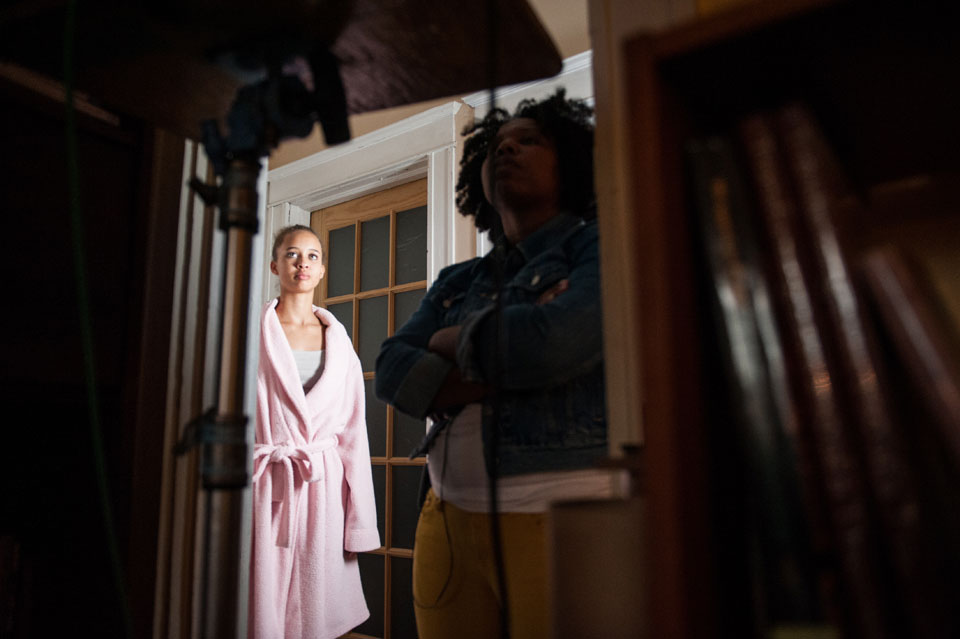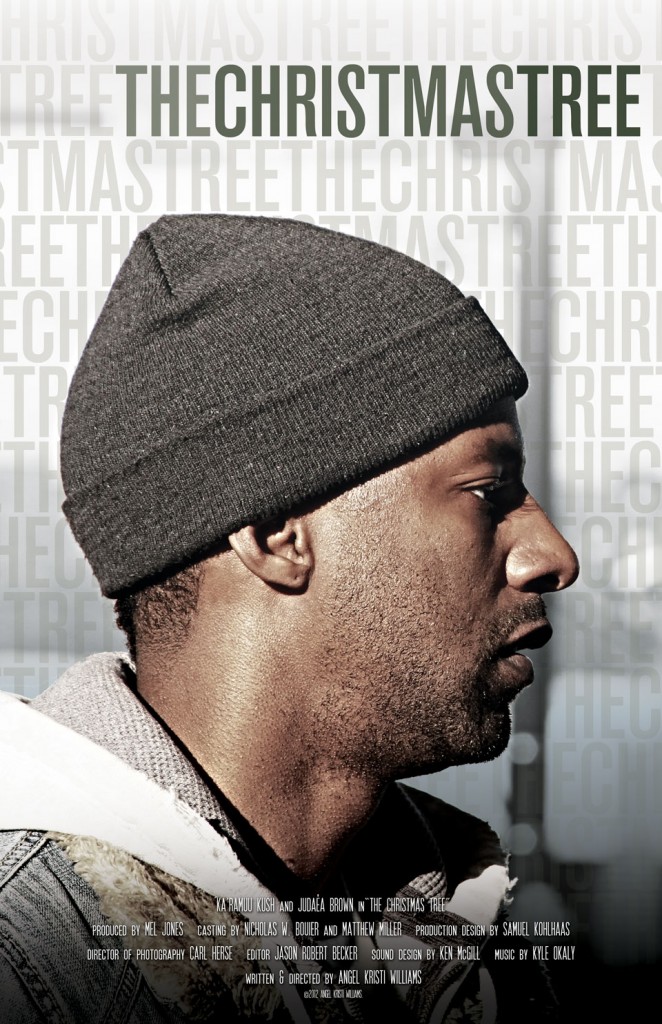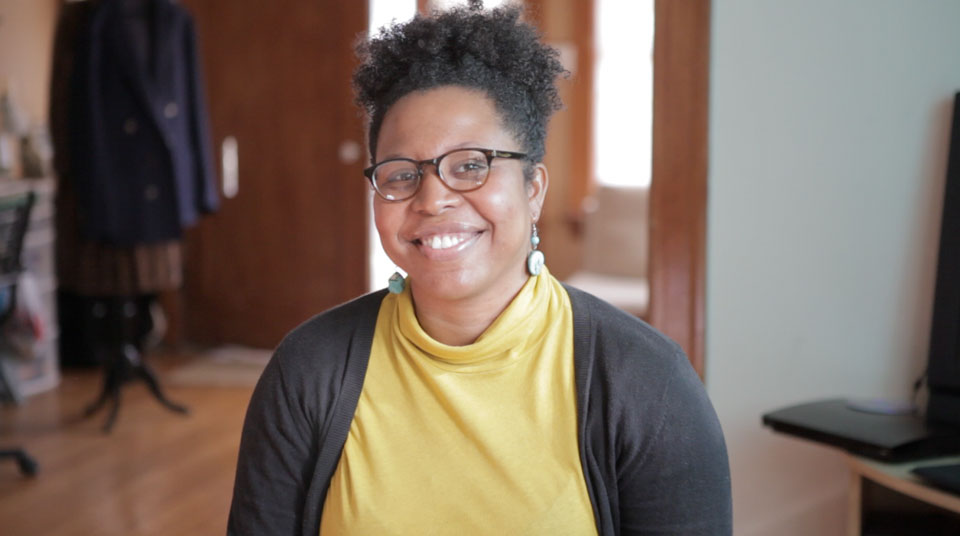Angel Kristi Williams
Angel Kristi Williams is a quiet powerhouse. She is exceedingly polite and enthusiastically ambitious for her films and for cinema overall. Although it is still early in her career, she has already developed an elegant and nuanced vision as a director and a writer. Originally from Baltimore Maryland, Angel received her BA in Visual Art (Photography & Film) from the University of Maryland. After graduation she worked in television for Discovery Communications before being awarded the Lumiere Scholarship to attend Columbia College Chicago as an MFA candidate in Cinema Directing. Her short film The Christmas Tree (you can view it on Vimeo) has screened at numerous festivals both domestically and internationally and garnered the attention of Participant Media, a production company committed to social responsibility through film. Angel is a ‘Project Involve Directing Fellow’ and was recently named one of ten Black directors to watch in 2014 by Paste Magazine.
This conversation took place in my home in Baltimore on March 31, 2014 when Angel was back in her hometown to shoot her new film.
MAD: I know you are a bit protective of the film as you just finished shooting yesterday, but can you tell me a little about the new film Charlotte?
AKW: The film is a coming of age story about two thirteen-year-old girls. The title character, Charlotte is the antagonist and the protagonist is Alex. The story follows Alex as she builds a new friendship with Charlotte. Alex is kind of a tomboy and becomes infatuated with Charlotte who is more mature and more popular at school. They hang out over the course of a weekend doing what teenagers do, and at a certain point Charlotte kisses Alex which really confuses Alex about what it means, what their friendship is and how she should react. Essentially it is about that first moment when you feel something about someone. It is a love story about friendship and all of the complexities about transitioning between being a kid and becoming an adult.
MAD: I know you intended on using a different house for the shoot and you ended up having to change the location at the last minute. Were there any other surprises between what you intended and what actually occurred during the shoot?
AKW: I haven’t watched the dailies yet. But from the way the sets looked and the performances, I think it turned out better than I imagined. When you develop and sit with a project for so long, you develop an idea of what it’s going to look and feel like. But I think it is more that I anticipated, there is more there than I initially imagined.

Brianna Cormier and Zayden Bates in a scene from Charlotte, written and directed by Angel Kristi Williams. Photo by Cooper Bates.
MAD: You grew up in Baltimore, lived here all your life until you moved to Chicago to go to grad school at Columbia College and now you have been living in Los Angeles for about a year and a half. I am interested in the image of Baltimore in the popular imagination. When I am travelling or corresponding with people and I mention Baltimore they inevitably mention The Wire or John Waters, both representations are extreme in their own ways. How do you feel about those representations and is your Baltimore different?
AKW: When people learn that I am from Baltimore I get the exact same thing although they talk more about The Wire than John Waters. I am always a bit wary of people who immediately mention The Wire when they want to talk to me about Baltimore. It’s really odd that the two things are so synonymous. I don’t know if people in other cities that have identifying shows have to deal with the same thing. But people think The Wire is the truth, it is an amazing show, although I must admit I just binged watched it for the first time after moving to LA. But is my image of Baltimore different? Yes.
I think there are depictions of Baltimore in The Wire that are very truthful and real. But when I grew up in the 1980s and 90s Baltimore was a very different place. Especially the neighborhood I grew up in Northwest Baltimore near Pimlico. Yes there were drugs, poverty and crime, but it was also a safe haven, the kind of thing depicted in The Wire would have been very foreign to me. My mom grew up in the McCollough Homes, the projects that are featured in the first season, with those scenes on the couch in the middle of the grassy area. And I don’t think her experience there was anything like The Wire. I have always felt that Baltimore is a very beautiful city. And the reason I wanted to shoot Charlotte in Baltimore is that it looks like no other.

Zayden Bates and Brianna Cormier in a scene from Charlotte, written and directed by Angel Kristi Williams. Photo by Cooper Bates.
MAD: Was it a political decision that you chose to make narrative films, as opposed to experimental films, the theater as the site of your work instead of the gallery?
AKW: Before I got serious about being a filmmaker, I thought I wanted to be a gallery artist because I like the idea of having work on the walls of galleries or museums, having the opening reception and connecting with people that way. But ultimately I chose narrative because I wanted to tell stories that were based on personal experiences, to explore the emotional dynamics between people. Photography led me to that because the more I thought about trying to tell a story with one image I realized that I wanted to tell a bigger story than that one perfectly composed image could.
MAD: I wanted to talk about your film The Christmas Tree that you shot in Chicago in 2012. It is such a quiet film but so much emotional and political force burns just below the surface. Without giving away the whole story, the last shot of the father and daughter sitting in the truck, silently is so full of resignation and forgiveness. You suggest so much without actually saying it.
AKW: Someone asked me recently about the relative lack of dialog in my films and I attribute that to studying photography and filmmaking at the same time. I was concentrating on photographic composition and the first two films I made in college were silent. So my introduction to storytelling was really influenced by silence and what the camera could tell and that has stayed with me. In an experimental film class I saw the Battle of Algiers and I was in awe especially with the final scene when they are hiding in the wall. I thought every scene in that film should be blown up and put on a wall. It was this idea that that each frame advanced the story in such a powerful way. So my aim is to tell the story visually first. I challenge myself to imagine the story only told through images. I think we sometimes forget that film is a visual medium. And that is the way I approached The Christmas Tree.
MAD: Yes I agree, but it’s not just a matter of good composition and lighting right? We all know films that are visually stunning but are boring, empty or pretentious. And it’s not just having a strong script either, because on the other hand there are so many literary films that feel so overly scripted. I think it was Truffaut who said that the best scripts don’t always make the best films because film needs to tell its stories visually. So what The Christmas Tree reveals to me is your ability to communicate to the actors their need to suggest complex emotional undercurrents in subtle ways.
AKW: The script should be like a blueprint that guides you but you have to be able to let it go, to improvise when the actors embodying the characters begin to live in those skins. While we were shooting this weekend there were a couple of points when my script supervisor challenged me when an actor omitted a line and she was ready to yell ‘Cut!’. I had to reassure her that the actor’s choice not to say it or say something different was sometimes better that what I had written.
MAD: Another example of that in The Christmas Tree is the mother, who I believe does not even say anything, she is only in one scene but I felt like I knew her. She is just standing on the porch as she says goodbye to her young daughter who is about to spend the weekend with the dad. And all of the ambivalence, hurt, and straining to be supportive is showing on her face as she says goodbye. Do you have a natural gift for working with actors or did you learn that?
AKW: I can’t take the credit for that at all, the actors are just good. I think direction is very hard, The Christmas Tree was the first time I had the opportunity to work with an actor of the caliber of Ka’ramuu Kush and I was really nervous about getting him to trust me. How do I, as a film student, communicate to someone with that much experience? It was like a child telling an adult what to do. But this weekend I was working with two teenagers with no film experience and I was even more nervous directing them. But finally its just about communicating your intentions that the actors understand what you have written and that they trust you and have the freedom to make choices as actors.
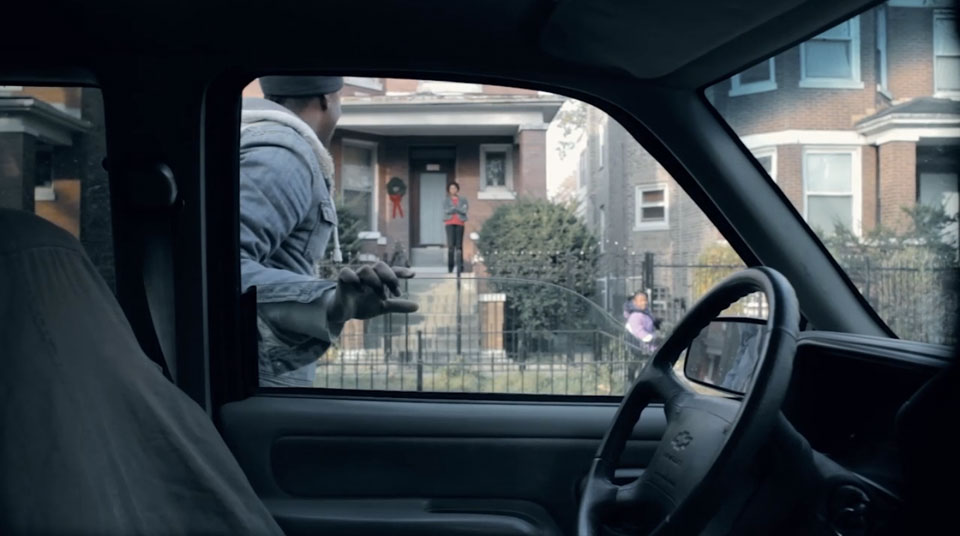
Ka’ramuu Kush, Shadana Patterson and Judaéa Brown in The Christmas Tree, written and directed by Angel Kristi Williams
MAD: Can you talk about some of the emotional and psychological issues you were working with when you were writing and then directing The Christmas Tree?
AKW: In the rehearsal process with Ka’ramuu who plays the dad Judaéa Brown who plays the daughter, I wanted them to develop not only a father / daughter relationship but also a friendship. The daughter is so mature that they related on a level unlike a typical father / daughter would. It is loosely based on my relationship with my father. We did not have a long rehearsal time because it’s such a low budget; I basically made the film with student loans. So Ka’ramuu and Judaea talked a lot on the phone, he was in Los Angeles and she was in Chicago and they really got to know one another and bonded immediately.
At the heart of the story I wanted to express this socio-economic problem in this family that they had no control over. There is a father who is trying his best to be a good dad, to be a good role model for his daughter, but his surroundings kind of prevent that. He does not have the economic means to do what is expected of him and so he fails. But I did not want to portray him as a complete failure. I wanted to suggest the complexity of how our resources or lack of resources can affect a child. Its so disheartening to observe people who are trying but can’t get out of their difficult situation but instead have to roll with the punches.
MAD: You directed a Public Service Announcement last year for an organization that is lobbying to bring down the cost of phone calls made to people in prison. Apparently families with loved ones in prison have to pay exorbitant rates to speak to inmates. Obviously this impacts poor people in a significant way. Can you talk about how you came to make that PSA? Were you interested in that particular issue before you made the PSA?
Also the structure and look of the PSA feels very much like one of your films. The scenes and acting are very naturalistic. There is no dialog, just a minimal voice-over, and again, you really let the images speak for themselves. Did you have much artistic freedom in making it or was there a script that you had to adhere to?
AKW: That opportunity presented itself within the first few months of moving to LA. A producer for ‘Participant’s Take Part TV’ saw my short The Christmas Tree and reached out to me. They were looking for a female director for the PSA to align with Ava DuVernay’s feature Middle of Nowhere. I wasn’t entirely aware of how serious the issue was before the project. They asked me to write a treatment and I immediately thought of a young Black boy being raised by a single mother. They loved the treatment and green lighted the idea. Since I wrote the script, I feel I maintained artistic freedom but when you’re delivering something like a PSA or a commercial – there are a lot of notes.
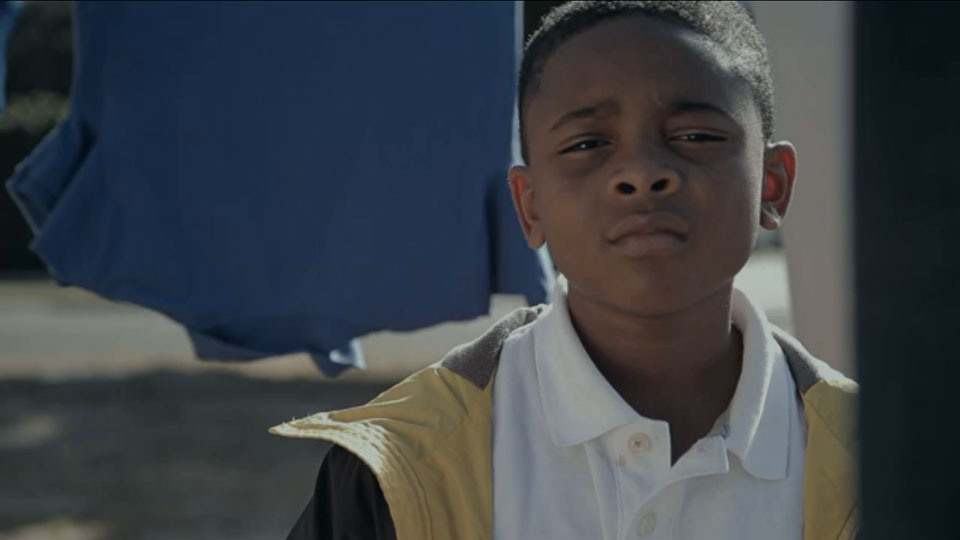
Scene from the Wright to Call Home Public Service Announcement, written and directed by Angel Kristi Williams
MAD: Perhaps it’s too early in your career to make such an observation but there seems to be an underlying optimism in your work, a generosity towards the world but that does not flinch from reality. That you find beauty in the everyday. Is that in your nature or is it a philosophical goal?
AKW: I think that is a very accurate observation although you are the first person to say it. I don’t consciously think about it but I do have an interest in mundane, everyday, common stories. It might be the reason I like a lot of foreign cinema especially Italian Neo-realism. I am an optimist yes, but ultimately I am drawn to stories that move me emotionally, and whether they are optimistic or not, does not matter. What matters is that they are truthful.
